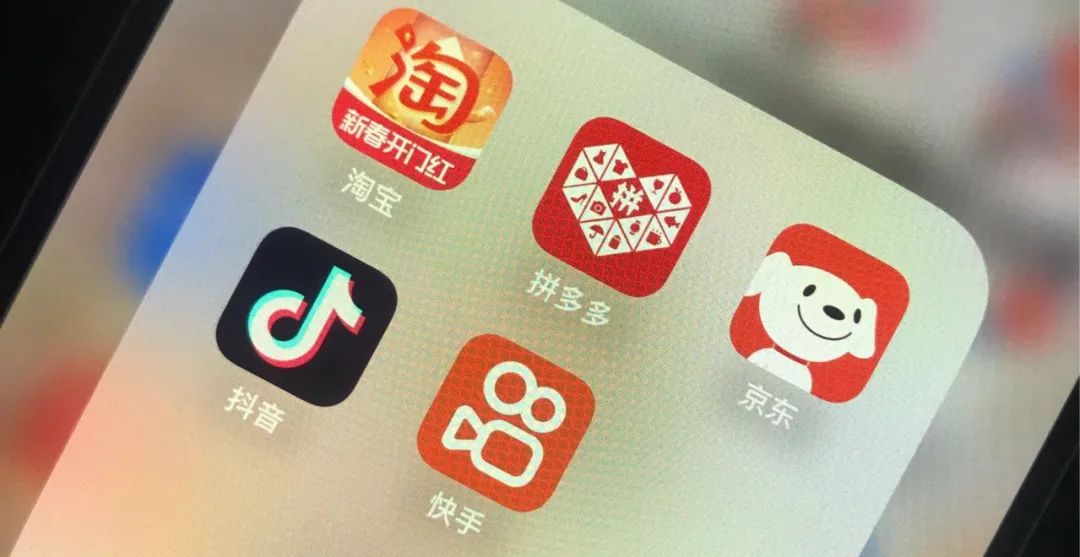E-commerce problem: please merchants or please users?
Original receiver Tech studio

Wen | Rao Yan
Editor | Brother Cai
To do a good job in e-commerce platform, should we pay more attention to merchants or users?
This is a controversial topic, and it is also a problem that is deeply confused by major e-commerce platforms. It seems that there is no standard answer.
Some people think that e-commerce platforms should pay more attention to merchants, because merchants can directly bring benefits to the platform; Some people think that we should pay attention to users, because users are customers who pay for money, "God" and traffic.
Some people think that both users and merchants should pay attention to it, but as a platform, e-commerce will treat merchants and users differently from a strategic perspective or from a specific implementation level, and it will inevitably focus on it.
For a long time in the past, both Ali and JD.COM, as established e-commerce platforms, and Tik Tok and Aauto Quicker, as emerging live e-commerce platforms, have consistently put businesses at the strategic core.
Compared with pleasing users, these e-commerce platforms pay more attention to pleasing merchants. After all, merchants can bring advertising, commissions and other service fees to the platform, which is also an important part of the existence of e-commerce platforms.
However, in the last two years, this concept has undergone a major change, and e-commerce platforms have begun to pay more attention to users.
In 2023, Ma Yun set the theme of "returning to Taobao, returning to users and returning to the Internet" for Ali’s transformation. One of the three themes is returning to users, emphasizing the importance of users.
In fact, Ali paid more attention to merchants in his early years, and "valuing merchants and neglecting users" was even regarded as Ali’s own gene. But now, while regaining the low-price strategy, Ali emphasizes paying attention to users and interprets e-commerce with his own experience. More attention should be paid to the laws of users.
JD.COM has repeatedly emphasized the importance of users in the process of pushing forward the low-price strategy. On March 29th, Liu Qiangdong, the founder of JD.COM, issued a letter to all employees, announcing that the corporate culture of JD.COM has been upgraded, and the core values of JD.COM have been upgraded to: customer first, innovation, hard work, responsibility, gratitude and honesty. Customer first has been used and put in the first place.
As a rising star of e-commerce, Pinduoduo has emphasized the importance of users since its establishment. Both its simple and direct "10 billion subsidy" and its harsh "only refund" model show the fact that Pinduoduo cares more about users than merchants.
As the latter, Pinduoduo can snatch food from other e-commerce platforms and develop rapidly. Paying attention to users is undoubtedly one of the secrets, which is also the real practice of the idea of "turning capitalism upside down" put forward by the founder of Pinduoduo in his early years.
At the end of last year, Taobao and JD.COM also launched a "refund only" service; At the beginning of this year, Tik Tok e-commerce also launched a fast refund service after delivery, which is aimed at all small shop merchants in the Tik Tok platform; At about the same time, Aauto Quicker e-commerce also upgraded the refund function after merchants agreed to reject it.
At this point, "refund only" has become a standard in the e-commerce industry, which means that the e-commerce platform finally chooses to lean towards consumers in the balance of interests of merchants, brands and users, and the e-commerce platform competes for users again.
In fact, the essence of retail is to provide users with better goods at lower prices and better services. In this sense, the e-commerce platform attaches importance to users, which is not only a transformation, but also a return, or a subversion of traditional production relations.
-01-
How do merchants and users view e-commerce platforms?
Consumers and businesses have different views on how e-commerce should be done and what kind of e-commerce the market needs.
Wang Li is a middle-level manager of an Internet giant. In the past years, he has been advocating all kinds of luxury goods. Many salespeople of big brands are his "WeChat friends". The annual shopping expenses range from hundreds of thousands of yuan to hundreds of thousands of yuan.
However, in the last three years, Wang Li’s consumption concept has changed. He is no longer obsessed with big brands, but pays more attention to adaptability. He usually shops through e-commerce platforms. "The quality of fruits that are killed by e-commerce platforms in a limited time is not worse than that of boutique merchants.; Daily necessities can also be purchased on the e-commerce platform. "
"Some daily necessities don’t need to pursue quality too much, as long as they can meet the demand. As for whether it is a brand or not, it is not that important on which platform to buy it." Wang Li told "handset tech (ID: tingtontech)".
Like Wang Li, more and more consumers are no longer loyal to an e-commerce platform, but choose the products they need to buy on different e-commerce platforms. They choose according to their needs, instead of blindly pursuing quality, they pay more attention to cost performance.

So what kind of e-commerce platform are businesses more willing to settle in?
The ultimate pursuit of merchants is to maximize profits. Which e-commerce platform can make merchants realize greater benefits, merchants are willing to cooperate with which platform. However, it is not easy to achieve this goal, which requires the cooperation between merchants and platforms, involving advertising services, commissions, platform policies, platform logistics, and promotional activities.
Liu Ming, the head of the manufacturer of clothing, shoes and hats in Guangzhou, told Earphone Tech that he was more willing to settle in Taobao and Tmall in his early years, because Ali paid more attention to the support and protection of merchants, and the platform brand was well-known and the traffic was large. "But in recent years, the traffic of Taotian was not as good as before, and our income was also affected."
In recent years, Liu Ming has changed his strategy and adopted a multi-platform operation mode. According to the characteristics and differences of various e-commerce platforms, he has promoted different product lines and diversified price systems. At the same time, he has increased cooperation with live broadcast e-commerce companies such as Tik Tok and Aauto Quicker.
Feng Li, a small and medium-sized manufacturer of towels, recently told "Earphone Tech" that "we have cooperated with different e-commerce platforms, and went to stock through Pinduoduo and 1688, and mainly made brands in Tmall."
Feng Li said that although the profit margin of low-priced platforms is not high, the sales volume is good. Although the profit margin of quality products is high, the investment is also more. "For example, the cost of Tmall stores is much higher and the operating costs are relatively large."
Feng Li calculated that compared with other e-commerce platforms, the profit rate of towels on Pinduoduo was at least 2 points higher, because of a large number of orders. "We also broadcast live in Aauto Quicker, and the price is also very cheap, and the sales volume is not bad." Feng Li said that the main income for one year now comes from two platforms: Pinduoduo and Aauto Quicker.
For businesses, it will cost more to be a brand. In the current economic situation, large sales volume and low cost are the pursuit of all businesses, and they are also the common requirements of a large number of small and medium-sized businesses for e-commerce platforms.
In recent years, with the return of mass consumption to rationality, the sales of many high-premium brand products have declined. In order to save the market, some high-premium brands have begun to cut prices sharply.
This is also an important reason for the rapid rise of Pinduoduo and Aauto Quicker in the past two years. In a rational consumption channel, excessive pursuit of brand premium won’t work, and high cost-effective goods have a way out. The surge in sales of white-brand goods in the past two years is also this logic.
-02-
Should e-commerce please merchants or please consumers?
Should the e-commerce platform pay more attention to merchants or consumers? There seems to be no standard answer, but time and reality give the final answer.
As a veteran e-commerce, Ali paid more attention to merchants in his early years, and "emphasizing merchants and neglecting users" was also regarded as a major feature of Ali. Ali emphasized in his early years that "there should be no difficult business in the world".
In the early days of e-commerce, many merchants didn’t understand e-commerce and wouldn’t sell online. Taobao put forward such a concept in those years, but now the times are different and e-commerce has matured. The platform should not only focus on how merchants sell good goods, but should pay more attention to letting consumers buy good goods.
For a long time in the past, Taobao Tmall’s platform grew bigger and bigger, and its business developed faster and faster, but users did not feel better service.
Sometimes there is a contradiction between users and merchants. When merchants can’t solve users’ problems, the platform customer service either can’t contact or doesn’t solve the problems. The customer service efficiency is very low, and many users have complained about such problems.
In those years, during the annual promotion activities, users finally enjoyed some preferential prices, and the e-commerce platform also vigorously promoted preferential prices. However, what the end users felt was not real cheap, but various words and routines, and the algorithms were also very complicated. In order to enjoy the preferential prices, users had to meet various requirements.
What is even more unacceptable to consumers is that even if users place orders in this way, they finally find that it is not much cheaper. Moreover, the e-commerce platform has been playing in this way for many years until consumers are bored with it.
In 2023, just as Ali’s market value was once surpassed by Pinduoduo, Ali employees left messages on the intranet, bluntly saying that Taotian should "simply buy, simply return, less routines and more benefits", which spoke out the voices of many users and also showed that Ali began to realize the problem.
In fact, Taobao’s early positioning was similar to that of Pinduoduo, and it grew up with low prices and small and medium-sized businesses. Unfortunately, Ali later abandoned many small and medium-sized businesses on his own initiative.
A few years ago, Ali firmly believed that an era of consumption upgrading was coming. Therefore, Taobao constantly upgraded its brand, introduced a large number of brands to settle in, and the annual technical service fee and default bond of the store also increased, causing some small and medium-sized businesses with weak competitiveness to leave Taobao.
This wave even spread to AliExpress, a cross-border e-commerce platform owned by Ali at that time. Around 2016, AliExpress more aggressively promoted brand transformation, requiring merchants to have corporate qualifications and brand authorization, and comprehensively cleaned up individual sellers.
In this way, not only small and medium-sized businesses have left Taotian and AliExpress, but also users have begun to choose other e-commerce platforms. The impact on Ali is that the development of Taotian has slowed down, the traffic has been separated, and the frequency and retention time of users have become less and less.

About ten years ago, AliExpress had almost no China rivals in the cross-border e-commerce field at that time, and it was very convenient for merchants to sell goods. With one click, the product information on Taobao could be transported to AliExpress. However, the departure of small and medium-sized merchants made AliExpress develop slowly after its initial success. In the last two years, the cross-border e-commerce fire broke out, and AliExpress started early but caught up with a late episode.
When Ali realized all this, the Internet had already bid farewell to the high-growth era in the past and entered the moment with the theme of reducing costs and increasing efficiency. At this time, Ali had to face not only Pinduoduo, a rapidly rising opponent, but also the impact brought by live e-commerce on short video platforms, and the original advantages of Taobao and Tmall were weakening.
To this end, Ali launched the largest organizational change since its establishment in 2023, and then made personnel adjustments. Zhang Yong’s position as Chairman of the Board of Directors of the Group was handed over to Cai Chongxin, and the CEO position was taken over by Wu Yongming. The CEO of Taotian Group, the core e-commerce business, was also replaced at the end of last year.
Ma Yun thinks that the situation of Taotian Group is very serious, and asks Ali to return to Taobao, users and the Internet.
If Ali started to return to users after a long walk, then Pinduoduo, as a rising star, decided to put users first from the beginning.
Unlike Ali, who pays more attention to businesses, Pinduoduo cares more about users. Ali emphasizes "no hard business in the world", while Pinduoduo makes users feel that "there is no hard goods in the world".
In fact, low price is a universal demand. No matter the rich or the poor, there is a demand for "what they want" at an "affordable price", and Pinduoduo attracts people who are looking for high cost performance.
People in this group may spend a lot of money on an expensive brand-name watch or spend 9.9 yuan on a towel, and Wang Li is one of them.
When Pinduoduo was founded, data showed that about 90% of China adults had never drunk Starbucks, 1.3 billion people had never been abroad, and 1 billion people had never been on an airplane, and low-and middle-income people still accounted for the vast majority.
What Pinduoduo needs to do is matching, so that the right people can buy the right things in the right scene, which can not only provide the consumers in the sinking market with the right goods, but also provide the consumers in the first-and second-tier cities with the matching goods categories.
This is not a consumption downgrade, but a consumption classification. Pinduoduo’s approach also has its own unique business logic.
The founder of Pinduoduo once wrote an article called "Turn Capitalism upside down", which mentioned that as the ultimate representative of capitalism, the essence of insurance is that the poor spend money to buy a product that "seeks stability in an uncertain future" from the rich, so as to strengthen their ability to resist risks, and eventually wealth will flow from the poor to the rich.
The article puts forward a hypothesis, can the rich buy "insurance" from the poor in reverse, that is, buy a kind of stability, so that wealth can flow from the rich to the poor?
"Everyone’s wishes, their needs and plans at some point in the future are often much clearer than others. Moreover, this kind of everyone’s planning and willingness, as well as the individual’s certainty of a certain behavior, are often valuable to the supplier who meets the demand. It can reduce the uncertainty of organizational production and help achieve more effective allocation of resources and capital. "
Based on this concept, the article believes that if there is a platform that can get enough customers to buy a certain product, integrate the customers’ needs and send an order to the factory, the factory will sell the products to these customers at a price lower than the market price.
Moreover, because this order pays a certainty to the factory, the factory can reduce the risk of market research and forecasting the production direction of the market, and also reduce the inventory cost.
In a sense, this is a new type of relations of production, which was really realized by Pinduoduo later, and became the underlying logic of Pinduoduo.
Perhaps many people once resented Pinduoduo’s "cutting a knife", but they have to admit that Pinduoduo’s "reverse capitalism" has succeeded. In the past two years, while most Internet giants have experienced a trough, Pinduoduo has been growing substantially.
This is not so much a victory of the new e-commerce model as a victory of embracing users in the Internet age.
-03-
How does the e-commerce platform please users?
How should the e-commerce platform please users? The first is low price.
The essence of retail is to provide users with better goods at lower prices and better services. Low price is the big killer, and cheap is the last word, which is also the truth confirmed by the development of domestic e-commerce.
Domestic e-commerce has developed for so many years, and the competition has never stopped, and the means of competition are also varied. However, the most powerful means of competition has never changed, and it is still a price war.
On June 1st, 2019, Pinduoduo entered the "618 Promotion" for the first time in an all-round way, and announced that in the form of "10 billion yuan cash subsidy", joint brand merchants would make substantial profits on 10,000 items with the highest popularity in the whole network.
Compared with the subsidies of other e-commerce platforms with complicated algorithms, Pinduoduo’s tens of billions of subsidies are simple and straightforward, either directly subsidizing or directly reducing prices, and there is no need to make a bill or play "full reduction", which also makes Pinduoduo, which was originally dominant in the sinking market, win more shares and uses.
According to the data in the early years, during the period of June 18, 2019, the number of orders in Pinduoduo exceeded 1.08 billion, and GMV increased by over 300% year-on-year. Since then, the subsidy of 10 billion yuan has become a long-term strategy of Pinduoduo and a powerful means to attract users. By this means, Pinduoduo artificially created a price depression and snatched a large number of user orders from Tmall and JD.COM.
In fact, in the early years, Taobao also defeated offline retail by relying on low prices, and began the prosperity of e-commerce; JD.COM also defeated Dangdang, the dominant book e-commerce company at that time, and Suning, the leading retailer of traditional household appliances, through low prices, thus winning a relatively stable market position.
Only later, with the continuous development of Taobao and JD.COM, the advantage of low price was lost. Until 2023, these two platforms began to pay attention to low price again.
In fact, since 2023, almost all e-commerce platforms have launched low prices. Besides Taotian and JD.COM, there are also live e-commerce platforms such as Tik Tok and Aauto Quicker. Like Pinduoduo, e-commerce in Aauto Quicker is also based on the sinking market, and in 2023, it ushered in a rapid growth in performance.

In addition to low prices, another way for e-commerce platforms to please users is to improve service quality and improve user experience. Since 2023, almost all e-commerce platforms have been working hard to improve the user experience.
Ali determined the theme of returning to e-commerce and returning to users, and established the strategy of building a big amoy. Facing the future, Taotian has determined three directions of "innovation and innovation", upgrading new scenes, new ecology and new technologies, among which the first one is user priority.
At the end of 2023, after Ma Yun shouted "Ali will change", Liu Qiangdong also replied to employees’ comments on the company intranet that JD.COM must change, otherwise there is no way out. "I believe we will definitely get out of the trough. Anyone and any company will experience several peaks and valleys to achieve greatness. "
Xu Ran, CEO of JD.COM, also responded that JD.COM has made some progress in price competitiveness, platform ecological construction and supply chain advantages. While the number of merchants has further expanded, the increase in the number of users has also proved the optimization of platform ecological construction.
Xu Ran said, "In the long run, JD.COM will resolutely pursue the ultimate user experience to maintain its core competitive advantage".
When e-commerce platforms begin to pursue low prices and changes, they all begin to emphasize user experience, which also means that e-commerce companies are changing their business philosophy and paying more attention to users’ needs.
Why are a large number of industrial belt enterprises willing to dig deep into the white-brand track? When the business model is based on "maximizing the unit consumption benefit", businesses can provide consumers with the products that best meet their actual needs at the lowest cost and price, and thus survive and develop.
In the future industrial world, whoever controls consumers will control manufacturing. If you can’t directly connect with consumers, you can’t win consumers, and you are doomed to have no longer-term future.
This is the future of retail and the long-term doctrine of e-commerce.
(Wang Li, Liu Ming and Li Feng are all pseudonyms. )
(Image source network intrusion. )
References:
1. "E-commerce volume to" refund only ",how to balance users and businesses? 》, source: Zijin Finance;
2. "The Great Change of E-commerce in 2023", source: "Hui Tan".
(Disclaimer: This article is only for information exchange and does not constitute any investment reference suggestions. )
—END—
Original title: "E-commerce problem: please merchants or please users? 》
Read the original text